Light From Heaven Read online
Page 7
“Though Jessie and I worked hard to gain everyone’s trust, it was Bertie’s way with people that brought them out, and their children with them, so that in time, all of us became family, all of us who lived then in this world above the clouds.
“We arrived here in September, having survived the long journey from Maine, and learned there had been serious floods.
“There we were, motoring up these narrow mountain tracks in a Buick Town Car, which my father had given the church as a charitable contribution! We had all our possessions in that old automobile, and oh, my, we were a sight for sore eyes. Pots and pans rattling about, and a baby cradle and steamer trunk lashed on top.
“Wilson’s Creek was so swollen, it was running like a river, and we couldn’t ford it. We lived in our car for two days, waiting for the water to subside. Then, one of the neighbors found us, and took us to their home. They fed us heartily and insisted we sleep in their bed while they slept on hardback chairs pushed together.
“Over the years, there have been bridges over Wilson’s Creek. One of steel, Father. Steel, mind you! And the floods came and washed them all downstream, never to be seen again. The plain truth is, many of those left up here don’t really want a bridge. Most of us use the one at McClellanville, two miles upstream.
“In any case, a lot of families have gone to live in Mitford or Wesley or Johnson City—adding yet another blow to the mission churches. Shifting demographics, they call it. Young people leave, old people die . . .”
“Roads get washed away,” he said, “bridges disappear downstream.” He lifted the thermos. “Agnes?”
“Please, Father. Thank you.”
He refilled both their mugs as the light slanted through the windows, and the cardinal sang in his bush by the door. “Should I call you Deaconess Merton or Deaconess Agnes?”
“Please. Call me Agnes.”
“And you may certainly call me Tim.”
“No, indeed, Father, I have never called a priest by his first name, and never shall.”
They lifted their cups in amused agreement.
“I won’t forget that dark night, on the eve of yet another fearsome storm, when we drove up at last to our rude little cabin, where we lived before the schoolhouse was built.
“We made our beds and ate our supper by the light of a lantern—there was no electric here until 1954—and lay down, frightened out of our wits. It didn’t seem an adventure anymore for two educated girls from Maine; it was suddenly a very real and terrifying scrape we’d gotten ourselves into.
“I remember the great shadows that flickered on the walls, cast by the lamp light. And the bats, Father, it was dreadful! The bats flew about our heads and swooped around the room, and then the storm rolled in upon us and we believed our time had come.”
She took a long, reflective draft of her tea. “Have you tasted sassafras before?”
“I have. I’m a Mississippi country boy.”
“It comes from a bush behind the schoolhouse, and the mint grows wild on the banks.”
“The schoolhouse is still standing, then!”
“Oh, yes. Like a rock, and just a short walk through the rhododendron grove. It’s been our home for many years. It was purchased from the Domestic and Foreign Missionary Society of the Protestant Episcopal Church in the United States of America.”
They laughed easily together.
“In all the years I’ve lived here, I can’t remember a rain so torrential, nor winds so fierce. The wind tore the roof off the cabin and flung it into the trees, and all the heavens opened above our heads.
“The rain came down with great force, beating upon us like hailstones, and because the lantern had been doused at once, we were thrown into utter darkness.”
Agnes gazed toward the altar as she spoke, as if she was viewing a film.
“I can’t begin to express our dreadful fear. We were completely disoriented, and ran barefoot over the broken glass of the lantern globe. We left the cabin and tried to find our car, but couldn’t—and through all this, I remember Little Bertie screaming with terror.
“I also remember crying out to God, and as I did, I realized for the first time that I didn’t know Him at all, that I had never surrendered anything of myself to God. I had reserved my heart and my soul as my own.”
She turned her gaze to the vicar.
“Jessie and I called our introduction to these mountains the Great Baptizing, and yet I had been baptized only upon my stubborn and willful head. It would be years, Father, before I knew the One True Baptism in my heart. You might say I grew into faith as a child grows into shoes bought too large.”
“And Jessie?”
“Jessie used to say that before we came to the ridge, she had been on speaking terms with Him. But after the storm, He became her best friend. I’m sure He remained so for the rest of her days.”
Agnes was pensive for a time, sipping her tea.
“I suppose you lost your wonderful automobile ...”
“Indeed, God protected it! He knew how we would rely on it for years to come, and it rode through that dreadful storm with barely a scratch.
“My gracious,” she said, suddenly contrite. “I’ll wear you to a frazzle going on like this!”
“Can’t be done. Not when there’s a good story at hand!”
“I’ve talked far too much about Agnes Merton. What are your plans, Father, for Holy Trinity?”
“We’ll have our hands full, getting things up to speed. I’ve just been making a list.”
“A list!” She removed a pair of glasses from her sweater pocket. “And what’s on it, may I ask?”
“Everything but the kitchen sink. A stove. A pulpit. A lectern. Fair linen. The whole nine yards. Kneelers. Prayer books. Hymnals ...”
“Thirty-seven prayer books are on the shelves of our old school.”
“You don’t mean it!”
“Do you use the 1928?”
“I grew up on it, but haven’t used it in years. I’m certainly willing, however.” He’d long wanted to refresh his knowledge of the much-venerated 1928 edition of the Book of Common Prayer.
“And hymnals.We have forty-one of those.”
“Forty-one!”
“They were bought only months before the church was closed; they’re in lovely condition.”
“Now, don’t tell me you have a pulpit and a woodstove.” He was jesting, of course.
“The pulpit is stored in our loft; Clarence waxes it every fall, to keep it from drying out in winter; he made it from oak off the mountain. And the stove is in our back room, which used to be the infirmary. It only needs oiling.”
“Agnes . . .”
“Yes, Father?”
“Is this a dream?”
“It certainly seems a dream to me. There were times when Clarence and I had given up utterly, but God always encouraged us. It’s hard to wait.”
“Very hard.”
“What are you waiting for, Father?”
He reflected, but only for a moment.
“For Kenny Barlowe to be found.” God forbid that Sammy might be lost yet again.
“Kenny Barlowe. I’ll commit to wait and pray with you.”
“Thank you, Agnes. Now, look what you’ve done. You’ve gone and made things easy for your new vicar.”
Smiling, she put on her glasses, and peered at his open notebook. “What else is on your list?”
“Fair linen.”
“In my bottom bureau drawer, wrapped in tissue paper. They say tissue keeps linen from yellowing.”
“A thurible.”
“I don’t know what they’d think of that. We were always low church here.”
“One less item to round up! As for getting our services under way, I believe the first Sunday in May would be realistic. That gives us time to collect ourselves.”
Agnes appeared thoughtful.
“Where will they come from, Agnes?”
“I can’t honestly say. Only three remain in these part
s who know anything of the Anglican form of worship. Two are elderly, but wise and sweet, and still get about. They’ll be so happy. And perhaps we’ll get some of the Baptist flock from below the creek. Their church burned to the ground last Christmas, a terrible thing. Clarence will take ’round a note from me, and we shall see whom the Lord appoints to grace this nave.”
Why did he suddenly feel like a child who had been rescued? Tears welled in his eyes.
“I feel very moved. Very . . . amazed.” He wiped his eyes with his handkerchief. “And very grateful.”
“Perhaps God has asked you to do something smaller than you’re accustomed to doing. Or perhaps He’s asked you to do something greater ...”
He nodded.
“. . . and thereby your wonder has been stirred.”
Yes! His wonder.
“Let’s walk over to the schoolhouse,” she said. “I’ll refill our thermos and find us a bite to eat.”
“Agnes,” he said, on impulse, “do you know anything about . . .” How could he possibly ask this?
“About what, Father?”
“Cutting hair?”
His wife leaned forward and squinted at him.
“Timothy! You’ve done it, at last! And I must say, it looks terrific!”
He sat beside her on the window seat, and put his arm around her and kissed her cheek.
“What is it, darling? You’re grinning like the Cheshire cat.”
“You’re not going to believe this,” he said.
He was interested to see they’d driven out from Mitford in the Jeep.
“I think she wanted to,” Dooley told him, “because, you know, because of you all.”
He saw her point. Lace Harper had her own sterling character traits.
He had stepped out to the front porch with Dooley, who was headed to the vet clinic to see Blake Eddistoe. Only yards away from their front steps, the lights of the clinic burned against the gathering dusk.
“No word from Sammy?”
“No, and I’m really worried. But I don’t want to go down there; I don’t want to see him.”
It was his father, Clyde Barlowe, whom Dooley didn’t wish to see.
“I’ll drive down next week, maybe Buck and I could make the trip together. Don’t worry. Keep praying the prayer that never fails.”
Dooley shoved his hands in his jacket pockets and gazed at the porch floor. “About what you said at Christmas . . .”
“What was that?”
“I said I’d like to take your name, and you told me to think about it. I’ve thought about it.”
Dooley raised his head and looked steadily at Father Tim.
“I want to take your name.”
Father Tim was quiet for a time, moved by the reality of this proposal. “Have you spoken to your mother? Would we have her blessing?”
“Buck wants to adopt Poo and Jessie, so they’ll be Leepers. I don’t see why it would matter for me to be a ... Kavanagh.”
“Would you like Cynthia and me to adopt you? Or do you just want the name change?” He hadn’t really wanted to ask this—what if he didn’t like the answer?
Dooley spoke at once. “Adopt.”
Wordless, Father Tim embraced the tall, intense young man who’d been given him so long ago, and held him close for a moment.
“Consider it done. I’ll call Walter, and we’ll go from there.”
Dooley’s voice was hoarse with feeling when he spoke at last. “One of our rams is down.”
“What is it?”
“Rams can get stones and crystals in their urinary tract, and it’s hard to pass a catheter in. I think Blake should treat it medically with antibiotics and anti-inflammatories and probably a change of diet, and the stones will dissolve and pass.”
“What does Blake think?”
“I’m going down to find out.”
“Son . . .”
“Yes, sir?”
“Give him our regards; we’ll see him up here for supper on Monday.”
Mind your temper, he wanted to say.
They heard the front door slam, and Dooley coming along the hall to the kitchen.
Father Tim saw the seething anger in his face.
“Blake’s going to create a stoma bladder hole; it’ll go directly through the stomach, which means the ram will urinate through the stomach like a ewe.”
“What’s the problem with that?” asked Father Tim.
“He’ll dribble urine, he’ll get a bad urine scald around that spot, and nobody will have time to take care of it.You have to wash the hole every day; nobody has time to do that . . .”
“Dinner is served,” said Cynthia.
Dooley yanked Lace’s chair away from the table, and held it for her.
“Let’s take a deep breath, sit down, and enjoy our meal together,” said Father Tim. “Then we can talk about the ram.”
Cynthia passed the prayer book to Lace. “Lace, dear, will you read this Lenten prayer for us?”
A faint blush of color came to Lace’s cheeks as she read in a firm, clear voice.
“Assist us mercifully with Thy help, O Lord God of our salvation; that we may enter with joy upon the meditation of those mighty acts, whereby Thou hast given unto us life and immortality, through Jesus Christ our Lord.”
“Amen!” they exclaimed together.
Father Tim extended his left hand to Cynthia, and his right to Lace. They bowed their heads.
“Lord, we thank You for the great power of Your grace in all our lives. Thank You for Lace and Dooley whom we love and cherish, and for the bright futures You’ve set before them. Thank You for the gifts You’ve so generously given Lace, which assisted her in winning this fine scholarship. Thank You for Your gift to Dooley of a heart concerned for all Your creatures, great and small.
“Thank You for Cynthia, who lightens and enriches the spirits of everyone who knows her. And now, Lord, thank You for this bounteous meal of the things Dooley enjoys most, and which we enjoy with him.You are good, O God, and You are faithful. Tenderize and soften our Lenten hearts, we pray, lest they grow brittle and break.
“In the name our Lord and Saviour, Jesus Christ, Amen.”
“Amen!”
Steak, oven fries, and arugula dressed with a hint of orange and walnuts. He had checked his sugar, and not only would he have some of everything, he would also have a hot roll. What’s more, he would butter it, hallelujah.
As the steak platter passed from Lace to Dooley, he felt Dooley’s mood brighten. His own spirits brightened, as well.
“Man!” said Dooley, forking the steak he’d earlier chosen as it came from the butcher’s paper.
Cynthia passed the potatoes, arrayed on a blue and white platter. “I’ve slaved over these fries,” she confessed, “and I think, I hope, I pray I got it.”
“Lace,” said Father Tim, “give Dooley a run for his money, and have a few more.” He was struck, as ever, by Lace’s extraordinary beauty, and the soulful depths of her amber eyes.
He recalled their first meeting several years ago. Instead of taking the road to Miss Sadie’s house, he’d cut through the massive grove of wild cinnamon ferns on the bank. Near the big oak, he’d come upon someone in a hat, digging ferns by their root balls and rustling them into a burlap sack.
He thought it a boy or young man until the culprit turned around in surprise. It was his first sight of Lace Harper, then Lacey Turner. He’d seen the fear in her eyes, and the fury, as he walked toward her.
“I’ll knock you in th’ head,” she’d said, “if you lay hands on my sack. I don’t care if you are a preacher.”
He’d asked her to consider replanting what she had dug, but she stood her ground. Cinnamon ferns had a strong dollar value on the local digging market.
She had grabbed her sack and mattock and fled, bareheaded and barefoot, down the embankment.
But God had greater plans for Lace Turner than digging ferns.
This harshly abused and largely self-educated
young woman had surrendered her life to Christ at a revival meeting conducted by Absalom Greer. Then, following the death of her mother, she’d been adopted by the town doctor and his wife, and was excelling in her studies at the University of Virginia.
Most people, he supposed, didn’t believe that miracles still happen. Those people were wrong.
“I think you got it,” said Dooley, hammering down on the fries.
“Crispier on the outside?” asked Cynthia.
“Yep.”
“Softer on the inside? More golden in color?”
“Yes, ma’am.”
“Dooley Barlowe! I can’t believe you called me ma am.
Lace laughed. “That’s really good.”
“I know I’m a Yankee, and such things aren’t supposed to matter, but would you continue to call me ma’am? I love the sound of it.”
Dooley laughed the cackling laugh that Father Tim loved to hear.
“How did you do it?” Lace asked the cook.
“Bottom line, it’s the pan. I’ve been using a lightweight pan, which caused the fries to look very pale and boring. So Avis suggested I use a heavy pan, and there you have it—the heavier pan conducts heat more evenly, and gives this lovely golden crust into the bargain.”
“Well done!” exclaimed Father Tim.
He decided not to be discouraged by what he occasionally saw in Lace’s eyes when she looked at Dooley. Sometimes it was fear. Sometimes it was anger. Sometimes it was love.
If they chose to spend their lives together, it wouldn’t be easy. Each had been required to survive violence, rejection, and the cancer of bitterness. To claim their survival, they had built walls that couldn’t easily be taken down.
And yet, while all this pertained, he would choose to trust what he saw right now, at this moment—a flush of genuine happiness in his boy, and in the bright and beautiful girl who had come so profoundly into their lives.
“Let me share a thought with you,” said the vicar. “George Macdonald wrote this: ‘Man finds it hard to get what he wants, because he does not want the best. God finds it hard to give, because He would give the best and man will not take it.’

 A Light in the Window
A Light in the Window Somewhere Safe With Somebody Good
Somewhere Safe With Somebody Good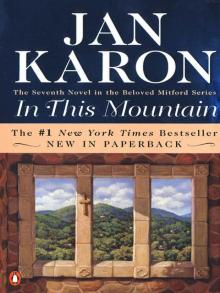 In This Mountain
In This Mountain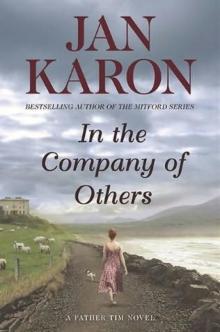 In the Company of Others
In the Company of Others Come Rain or Come Shine
Come Rain or Come Shine To Be Where You Are
To Be Where You Are These High, Green Hills
These High, Green Hills Light From Heaven
Light From Heaven A New Song
A New Song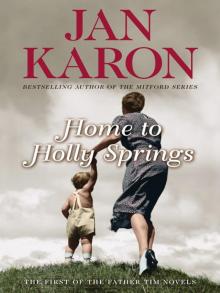 Home to Holly Springs
Home to Holly Springs The Mitford Bedside Companion
The Mitford Bedside Companion At Home in Mitford
At Home in Mitford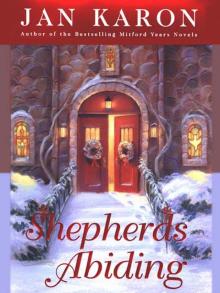 Shepherds Abiding
Shepherds Abiding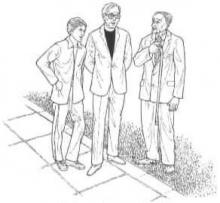 Out to Canaan
Out to Canaan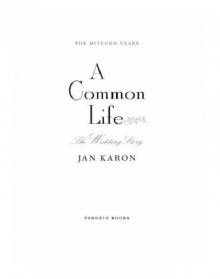 A Common Life: The Wedding Story
A Common Life: The Wedding Story Jan Karon's Mitford Years
Jan Karon's Mitford Years